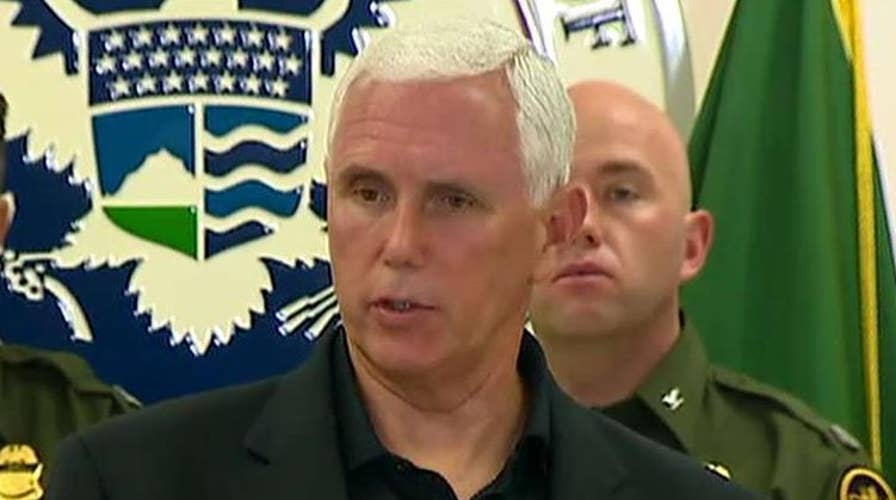Mike Pence calls on Congress to fix the crisis at the border after visiting migrant detention facility
North Carolina Republican Sen. Thom Tillis says the border crisis can only be solved by Congress providing ICE with the resources that they need.
I joined Vice President Mike Pence and members of the Senate Judiciary Committee Friday in a visit to a migrant detention center in Texas to witness firsthand how much work we have left to do to secure our southern border.
The situation is dire. Smuggling cartels tell lies about instant asylum and open borders and have drawn migrants by the hundreds of thousands to border stations near McAllen and El Paso in Texas, along with other crossings along the Rio Grande.
It isn’t until they arrive that migrants discover the truth: applying for legal entry into the United States is a long, confusing process. There are rules – and the line started forming years ago.
PENCE VISITS MIGRANT DETENTION CENTER NEAR SOUTHERN BORDER, SAYS ICE RAIDS WILL TARGET CRIMINALS
Migrants from all over the world have experienced a similar shock.
Acting Homeland Security Secretary Kevin McAleenan and Acting Immigrations and Customs Enforcement (ICE) Director Mark Morgan joined us for a briefing hosted by the McAllen sector team. What we heard shocks the conscience.
They told us to think of the cartels like we would a big business: they deal in drugs, and human beings, and gauge success and failure in terms of their bottom line.
Trafficked humans who “earn their passage” via forced servitude in criminal organizations, labor gangs, and sex trafficking rings bring in much more money than migrants who can pay their own way to the border.
The cartels are exploiting desperate situations in the developing world, and they’re doing it using web and Facebook ads, like the world’s most perverse travel agency. Some even offer pricing schedules. If you want to travel “first class,” expect to pay first-class prices.
The idea of a first-class migrant caravan through the Mexican desert sounds absurd, but the strategy is working. Last year, the McAllen sector recorded 162,000 apprehensions. This year, officials have already apprehended 283,000 migrants from 60 countries, including Syria, Iran, Pakistan, Yemen and Turkey.
The backlog for asylum hearings alone now approaches 1 million cases – a caseload requiring the attention of at least 500 judges.
To abandon those waiting for help would be immoral. To open the gates and suspend the rules would create chaos. To put politics ahead of fixing this mess is not an option.
Our Border Patrol men and women are heroes. Despite the constant disparagement in the media and by public officials, these dedicated officers show up for work every day and proudly do their jobs.
While the talking heads rage about “concentration camps,” members of the Border Patrol are pulling quadruple duty as law enforcement officers, case workers, nurses and humanitarian aid workers.
And for the record, we spoke with detainees through an interpreter, and everyone we met confirmed they were properly fed and had a safe place to sleep.
So, what do we do? Turns out, there’s an answer to that question.
Border Patrol officials have consistently asked Congress for three things: a barrier, better surveillance and tracking technology, and more boots on the ground.
Resources are not enough, though.
Changes to our asylum laws that would allow migrants to apply in their home country, or in a safer third country, would reduce the strain on holding facilities and personnel.
Modifications to the Flores rule, which establishes procedures the government must follow when it detains migrant children, would allow for an expedited decision-making process.
I first raised specific concerns with regards to migrant influx, safety and family reunification in 2014, but this crisis took root long before then.
Rather than addressing the causes of the problem, obstructionists in Washington have spent the better part of a decade chasing down news cameras and pointing fingers, rather than proposing workable legislation.
CLICK HERE TO GET THE FOX NEWS APP
Congress has approved supplemental funding for border security, but that’s no substitute for real reform.
Bottom line: We owe it to our Border Patrol officials, the American people, and earnest asylum seekers to put the talking points aside and give them the resources they are asking for.









































